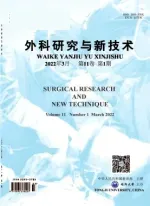Surgical treatment for superior mesenteric artery compressing syndrome in 28 cases
2012-08-15ZhaiBaoping
/Zhai Baoping
(翟保平,Dept Gen Surg,Peop Hosp Henan Provin,Zhengzhou 450003)…∥Chin J Gen Surg.-2011,14(8).-726~728
ObjectiveTo evaluate the diagnosis and operative modality for superior mesenteric artery compressing syndrome(SMACS).MethodsThe clinical data of 28 SMACS cases from January 2000 to December 2010 at this hospital was analyzed retrospectively.ResultsAll patients underwent barium meal examination and the diagnosis was established according to clinical symptom and barium study.The 28 cases of SMACS underwent surgical treatment.The operative modalities included lysis and downward movement of the Treitz ligament and extensive mobilization of the duodenum in 4 cases,gastrojejunal anastomosis in 2 cases,lysis of the Treitz ligament and Roux-en-Y duodenojejunostomy in 11 cases,BillrothⅡ gastrectomy in 7 cases,and anterior duodenojejunostomy in 4 cases.All patients were cured and discharged from hospital.ConclusionThe diagnosis of SMACS should mainly on barium meal examination besides the typical clinical manifestations such as epigastric distending pain and vomiting.Lysis of the Treitz ligament and Roux-en-Y duodenojejunostomy is appropriate surgical procedure to deal with SMACS.8 refs,
猜你喜欢
杂志排行
外科研究与新技术的其它文章
- Value of diffusion-weighted MR imaging and dynamic-contrast enhanced MRI in the diagnosis of breast cancer
- Meta-analysis of the efficacy between gemcitabine-alone and gemcitabine-based chemotherapy applied to advanced pancreatic cancer
- Effect of decompression in different time on hemodynamics and oxygen metabolism of porcine model with severe acute pancreatitis combined intraabdominal hypertension
- Postoperative use of Sorafenib in liver transplantation patients of hepatocellular carcinoma beyond Milan criteria
- Combined liver-kidney transplantation and orthotopic liver transplantation in the treatment of severe hepatitis B
- HO-1 up-regulation decreases liver ischemia/reperfusion injury by inhibiting mast cells degranulation
